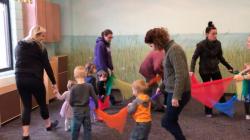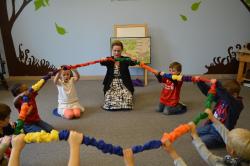FAQ
Parents are an integral part of class in the younger years. For all classes, parents are asked to include active music making in their child’s life. Sing along with the music. Play echo games, making up patterns, as we do in class. Seeing you participate communicates that what we are doing is safe, fun, and important.
Which class should I choose? The ages appear to overlap.
There will naturally be some overlap as young children move rapidly into new ages and stages over the course of the year. If you are not sure which class would be the best fit, just speak to the teacher about visiting each class until you find the one that is right for your child as you consider where your child would be most comfortable.
Mommy & Me: Babies is geared toward non-mobile or very newly mobile babies (6--18 months). The activities are highly repetitive and the pace is slow and laid-back. Parents are introduced to many lullabies and rocking songs. Families bring their own instrument kits to class because we expect babies to put everything in their mouths!
Mommy & Me: Toddlers (18 mon--3 years) is quite a bit more active by comparison. Children in this class usually aren't content to sit still for long, and we frequently switch gears between stationary activities and active movement. We begin to explore a greater range of classroom instruments and manipulatives. Taking short attention spans into account, a half-hour class will typically feature more than a dozen separate seperate activities! We begin and end each class in circle time.
Can I bring more than one child to class?
Babies (12 months and under) may accompany a big brother or sister to any class for children between the ages of 0-5 free of charge. Families registering more than one child may request a 10% sibling discount off the combined tuitions.
Children and parents can have so much fun at home and in the car with Musikgarten songs and dances. In class you learn the songs, but at home is where you really have fun with the songs and dances. It's a great family bonding time. Try it and you won't have to ask this question ever again!
What does it mean when you say Musikgarten has a nine-year developmental plan for my child?
Each of the classes are interrelated, as they were written for children to grow-up with Musikgarten. This sequential planning also makes it easier for the students to grow in their musical competence and graduate to instrument playing.When your child has graduated from the Mommy & Me classes for Babies and Toddlers, Musikgarten continues to build on this solid foundation with the following classes:
Preschool (ages 3-5)
Cycle of Seasons
There is a new emphasis on focused attention, imagination, story telling, the rhythm of poetry, guided creative movement, self-expression, and purposeful movement transferred to instruments.
Kindgarten (ages 5-6)
Music Makers: At Home in the World
At this stage, students are systematically introduced to the families of orchestral instruments (brass, percussion, woodwinds, and strings) in our program. The concept of musical notation is introduced (the association of visual graphics with the aural patterns they have come to recognize in previous classes). There is a new emphasis on ensemble devleopment (two-sections of instruments, duets, beginning rounds, borduns, ostinati, etc.) Children receive their own notebook album for their compositions, flash cards, dication activities, and instrument pages.
Grades 1-2 (ages 6-7)
Music Around the World
The learning continues as we explore different cultures, language, traditions, and of course music. Units include: The British Isles, Germany, the Amerindians, and the African-American heritage.
Group Piano: (Ages 6--9).
Group piano lessons featuring the music your child has grown up signing and playing.
Does Musikgarten today better prepare students for piano lessons?
Yes, in most cases. Musikgarten classes develop students' aural senses more than other pre-piano methods. The Music Makers: At the Keyboard classes are taught in a group session, so that children learn from each other and grow in their comfort of playing with and in front of one another.
When should my child begin formal instrument lessons?
Musikgarten classes build a strong musical foundation in the most developmentally appropriate way. Young children are interested in singing, playing, dancing, moving, and experimenting with instruments--rather than being still and practicing for 30 minutes a day. The skills and emerging literacy that students develop in Musikgarten usually propel them far ahead when they do begin to study an instrument around the recommended age of six or seven.
Why should I pursue early childhood music education for my child?
Music awakens and stimulates neural pathways in the brain that are associated with higher forms of intelligence, such as abstract thinking, empathy, mathematics and science. Music's melodic and rhythmic patterns provide exercise for the brain and help develop memory. (Remember singing the ABC song to learn your ABC's?) Studying music helps children establish good listening habits, which are essential for achievement in school. Overall, music activities are perfect for child development. Music immerses the child in language, evokes movement, stimulates the brain, fosters physical coordination, and all of this in a group setting that builds community.
As my child gets older there seem to be more and more activities for him/her to do? Why should I continue with music and movement training?




